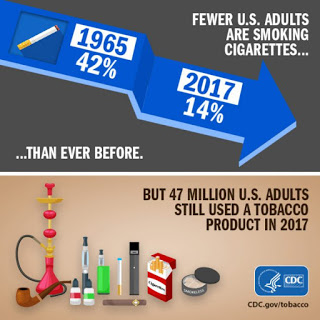Cigarette smoking rates among U.S. adults are at a historic low, 14%, but one in five still use some type of tobacco-based product

By Melissa Patrick
Kentucky Health News
Cigarette smoking rates have hit their lowest level ever, but 47 million Americans still use some type of tobacco-based product, prompting government officials to say there’s more work to do.
Smoking rates among adults dropped to about 14 percent in 2017 from 15.5 percent in 2016, according to the Centers for Disease Control and Prevention, the Food and Drug Administration and the National Cancer Institute. That’s a drop of two-thirds from 42 percent in 1965, the first year national smoking rates were recorded.
The current rate for young adults 18 to 24 dropped even more than the overall rate, to 10 percent in 2017 from 13 percent in 2016.
However, use of electronic cigarettes among young people is burgeoning, and one in five Americans, still use some type of tobacco-based product, and 34 million of the 47 million users still smoke. Kentucky’s latest reported adult smoking rate is 24.5 percent.
The national figures were published in the CDC’s Nov. 9 Morbidity and Mortality Weekly Report. Using data from the 2017 National Health Interview Survey, the CDC found that use of tobacco-based products was highest among people with a high-school equivalency diploma or GED (43 percent), those without health insurance (31 percent), people on Medicaid (28 percent) or other public insurance (27 percent), people who are lesbian, gay or bisexual (27 percent), people with an annual household income under $35,000 (26 percent), people with a disability (25 percent) and in the Midwest or South.
“Demographic and geographic tobacco-use disparities make clear that we have much work to do, especially in states like Kentucky,” Ben Chandler, president and CEO of the Foundation for a Healthy Kentucky, said in a news release. “The latest numbers point the way for health advocates: we must focus our efforts to counter tobacco industry targeting of lower-income, less-educated, and minority populations.”
In addition to the 14 percent of U.S. adults who self-identified as cigarette smokers in 2017, 3.8 percent said they smoked cigars, cigarillos or filtered little cigars; 2.8 percent said they used electronic cigarettes, 2.1 percent said they used smokeless tobacco, and 1 percent said they used pipes, water pipes or hookahs. About 9 million tobacco users, or 19 percent, reported using two or more tobacco products, with cigarettes and e-cigarettes as the most common combination.
Chandler stressed that it’s important to continue to watch how e-cigarettes affect behavior and health.
“The jury is still out on whether they will reduce overall tobacco use and illness among adults or, because of the explosion in teen e-cigarette use, end up addicting a whole new generation or creating a whole new set of health issues,” he said.
The CDC report calls for comprehensive tobacco-control programs at national, state and local levels, noting such strategies and interventions as its Tips From Smokers campaign, the FDA’s “Every Try Counts” campaign and the cancer institute’s Smokefree.gov and toll-free quitline (1-800-QUIT NOW).
The president of the Campaign for Tobacco-Free Kids, Matthew L. Myers, offered other policy suggestions.
“To win the fight against tobacco, policy makers at all levels must fully implement the proven strategies that have driven our progress,” Myers said in a news release. “These include significant tobacco-tax increases, comprehensive smoke-free laws, well-funded tobacco prevention and cessation programs, hard-hitting mass media campaigns, barrier-free health insurance coverage for tobacco-cessation treatments, and laws raising the tobacco sale age to 21.”
Smoking is considered the leading cause of preventable death, killing more than 480,000 Americans a year at a cost of $170 billion annually for related health care expenses, according to the CDC. About 16 million Americans suffer from a smoking-related illness.
“For more than half a century, cigarette smoking has been the leading cause of cancer mortality in the United States,” NCI Director Dr. Norman E. Sharpless said in a news release. “Eliminating smoking in America would, over time, eliminate about one-third of all cancer deaths.”
The latest report did not reveal updated youth tobacco use rates, which are expected to be released within the next few weeks. State-level data require more processing and are issued after national figures.